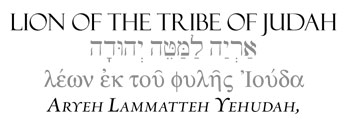Praying the Names of God - March 17
From Praying the Names of Jesus Week Fourteen, Day One
The Name
Only once in the New Testament is Jesus described as a lion. The book of Revelation (named in part for what it reveals about Christ) portrays the risen Jesus as the only one worthy to open the scroll that contains the ultimate unfolding of God's purposes for the world. The apostle John perceived Jesus as both Lion and Lamb, who through his death and resurrection becomes the ultimate victor and conqueror. When you pray to Jesus as the Lion of the Tribe of Judah, you are praying to the One with the power to banish all fear, to the One who watches over you with his fierce protecting love. You are also praying to the One who is judge of the living and the dead.
Key Scripture
I wept and wept because no one was found who was worthy to open the scroll or look inside. Then one of the elders said to me, "Do not weep! See, the Lion of the tribe of Judah, the Root of David, has triumphed. He is able to open the scroll and its seven seals." Revelation 5:4-5
***
Monday
His Name Revealed
Judah, your brothers will praise you;
your hand will be on the neck of your enemies;
your father's sons will bow down to you.
You are a lion's cub, O Judah;
you return from the prey, my son.
Like a lion he crouches and lies down,
like a lioness — who dares to rouse him?
The scepter will not depart from Judah,
nor the ruler's staff from between his feet,
until he comes to whom it belongs
and the obedience of the nations is his.
>Genesis 49:8 - 10
Then I saw in the right hand of him who sat on the throne a scroll with writing on both sides and sealed with seven seals. And I saw a mighty angel proclaiming in a loud voice, "Who is worthy to break the seals and open the scroll?" But no one in heaven or on earth or under the earth could open the scroll or even look inside it. I wept and wept because no one was found who was worthy to open the scroll or look inside. Then one of the elders said to me, "Do not weep! See, the Lion of the tribe of Judah, the Root of David, has triumphed. He is able to open the scroll and its seven seals."
Then I saw a Lamb, looking as if it had been slain, standing in the center of the throne, encircled by the four living creatures and the elders. The Lamb had seven horns and seven eyes, which are the seven spirits of God sent out into all the earth. He went and took the scroll from the right hand of him who sat on the throne. And when he had taken it, the four living creatures and the twenty-four elders fell down before the Lamb. Each one had a harp and they were holding golden bowls full of incense, which are the prayers of God's people.
And they sang a new song, saying:
"You are worthy to take the scroll and to open its seals, because you were slain, and with your blood you purchased for God members of every tribe and language and people and nation.
You have made them to be a kingdom and priests to serve our God, and they will reign on the earth." Revelation 5:1 - 10
Jesus, you are the Lion of the Tribe of Judah. Thank you for your fierce love and your strong protecting power. Come with your might and rule over us. Defeat your enemies and ours, extending your reign throughout the universe.
Understanding the Name
Today, lions can be found in sub-Saharan Africa and in northwest India. But in biblical times lions also roamed the region of the world now comprised of Israel, Syria, Iran, Iraq, Greece, and Turkey. From ancient times their images have graced thrones, palaces, gates, and temples, including the temple in Jerusalem. First Kings indicates that King Solomon's throne was adorned with twelve lions, symbolizing his greatness and power. And Ezekiel pictures the cherubim with lion's heads.
Throughout the Bible, the lion appears as a symbol of might, and it is hardly surprising that Israel's enemies are sometimes depicted as lions. In the New Testament, Peter calls the devil a roaring lion and warns believers that he is constantly on the prowl, looking for someone to devour.
Though lions are sometimes a symbol of evil, they are also used as symbols of God's people.
Near the end of his life, the patriarch Jacob prayed a blessing over his twelve sons. When it came time to bless Judah, he compared him to a lion — hence the phrase "the Lion of the Tribe of Judah" (Aryeh Lammatteh Yehudah in Hebrew, pronounced ar-YEH la-mat-TEH ye-hou-DAH, or Leon ek tou Phyles Iouda, in Greek, pronounced LE-own ek tou fu-LAIS YOU-dah). Jacob's prediction that the scepter would not depart from Judah has been traditionally applied to the Messiah.
In the Hebrew Scriptures, Yahweh is sometimes depicted as a lion who roars in judgment against the nations and against his own faithless people.
But he is also depicted as a mighty lion who fights fiercely on behalf of his people.
Revelation depicts the risen Christ as the mightiest of all victors. He is the Lion of the Tribe of Judah, the one found worthy to open the scrolls of history, meaning that he is in charge of history and of how the world's destiny unfolds.
Studying the Name
- Why do you think the book of Revelation portrays Jesus as both Lion and Lamb?
- In the Bible "seven" is considered a sacred number, symbolizing perfection or completeness, while a "horn" symbolizes power. What does this say to you about how the Lamb is portrayed in Revelation 5?
- How have you experienced and understood both the "lamblike" and "lionlike" nature of Jesus in your own life?
- If you could choose one adjective to describe this passage from Revelation, what would it be and why? Would you call it bizarre, moving, perplexing, enlightening, or something else?
Check out Ann's newest books on AnnSpangler.com. To hear more from Ann Spangler, sign up today at annspangler.substack.com.
Meet your spiritual ancestors as they really were: Less Than Perfect: Broken Men and Women of the Bible and What We Can Learn from Them.






